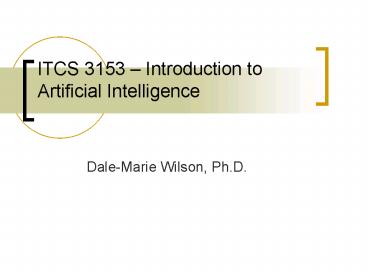ITCS 3153 Introduction to Artificial Intelligence - PowerPoint PPT Presentation
1 / 34
Title:
ITCS 3153 Introduction to Artificial Intelligence
Description:
Weak AI = solves complex problems. Models intelligent behavior ... Hobbes: The Leviathan. A Brief History of Artificial Intelligence (cont'd) 20th century ... – PowerPoint PPT presentation
Number of Views:65
Avg rating:3.0/5.0
Title: ITCS 3153 Introduction to Artificial Intelligence
1
ITCS 3153 Introduction to Artificial
Intelligence
- Dale-Marie Wilson, Ph.D.
2
Strong and Weak AI
- Strong AI gt thinking
- Intelligence
- Reasoning/Processing
- Weak AI gt solves complex problems
- Models intelligent behavior
3
Strong and Weak AI
- Strong methods
- Use knowledge
- Weak methods
- Logic
- Automated reasoning
4
A Brief History of Artificial Intelligence
- 5th century BC
- Aristotle syllogistic logic
- 17th century
- Pascal 1st mechanical, digital calculator
- Hobbes The Leviathan
5
A Brief History of Artificial Intelligence
(contd)
- 20th century
- 1923 Introduction of robot to English language
- 1941 1st electronic computer
- 1950 Isaac Asimovs 3 laws of robotics
- 1956
- Term Artificial Intelligence coined
- The Logic Theorist (LT)
6
A Brief History of Artificial Intelligence
(contd)
- 1957
- General Problem Solver (GPS) Newell Simon
- 1952 1962
- Samuel Programs for checkers
- 1958
- LISP LISt Processing - McCarthy
7
A Brief History of Artificial Intelligence
(contd)
- 1961
- SAINT Solves closed-form calculus integration
problems - 1967
- ANALOGY Solves analogy problems on I.Q. tests
- 1969
- IJCAI International Joint Conference on
Artificial Intelligence - 1971
- SHRDLU
8
A Brief History of Artificial Intelligence
(contd)
- 1997
- Deep Blue Chess program beats world champion
- Robotic soccer tournaments
- 2000
- Smart Toys commercially available
9
A Brief History of Artificial Intelligence
(contd)
- Reality Check
- Current solutions did not scale up to larger
problems - Slowed progress decreased investment dollars
- Waning research dollars
- Recovery
- Fuzzy logic Japan
- Neural networks
- Increased military funding
10
Approaches to Artificial Intelligence
- Two basic approaches
- Top-down
- Mimics human brains behavior
- Iteratively decomposes larger problems into
smaller goals - Bottom-up
- Replica of human brains neural network
- Determines subgoals gt solves
11
Approaches to Artificial Intelligence (contd)
- Symbol-Processing Approach
- Based on Newell Simons Physical Symbol System
Hypothesis - Commonly referred to as Classical AI
- Uses logical operations that are applied to
declarative knowledge bases (FOPL) - Represents knowledge about a problem as a set of
declarative sentences in FOPL - Logical reasoning methods are used to deduce
consequences
12
Approaches to Artificial Intelligence (contd)
- A.k.a the knowledge-based approach
- Knowledge Layer knowledge needed by the machine
or system - Symbol Layer knowledge represented in symbolic
structures and operations on structures defined - Lower Layers Operations are actually implemented
- Uses top-down design
13
Approaches to Artificial Intelligence (contd)
- Expert/ Knowledge-based systems
- Task goal-oriented/problem solving activity
- Domain area in which task to be performed
- Knowledge engineer builds expert system
- Knowledge representation organization of
knowledge - Production rule consists of condition and action
- Unit list of properties and associated values of
entity
14
Approaches to Artificial Intelligence (contd)
- Expert/ Knowledge-based systems
15
Approaches to Artificial Intelligence (contd)
- Subsymbolic Approach
- Proceeds in bottom-up style
- Starts at lowest layers and works upward
- Signals used instead of symbols
- Popular subsymbolic approaches the animat
approach neural networks and genetic algorithms
16
Approaches to Artificial Intelligence (contd)
- Associated with Boolean algebra
- Collection of logic concerning AND, OR and NOT
operands - Example
- Apples are red-- is True
- Apples are red AND oranges are purple-- is False
- Apples are red OR oranges are purple-- is True
- Apples are red AND oranges are NOT purple-- is
also True
17
Some Areas of AI Research
- Game Playing
- Automated Reasoning
- Expert Systems
- Natural Language Processing
- Human Performance Modeling
- Planning
- Robotics
18
Some Areas of AI Research (contd)
- Human-Computer Interaction/Intelligence
- Natural Language Processing
- Speech Processing
- Pattern Recognition (Gestures, eye movements,
etc.) - Intelligent User Interfaces Computer-Aided
Instruction. - Machine Learning
- Neural Computing
- Fuzzy Computing
- Evolutionary Computing
19
State of the Art
20
State of the Art
21
State of the Art
22
State of the Art
23
State of the Art
24
State of the Art
25
State of the Art
26
State of the Art
27
State of the Art
28
State of the Art
29
State of the Art
30
State of the Art
31
State of the Art
32
State of the Art
33
State of the Art
34
Next Class
- Read Chapter 2































